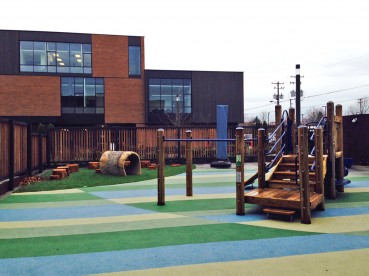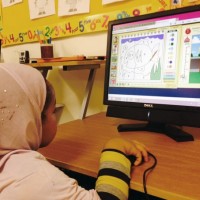This content was published: December 10, 2014. Phone numbers, email addresses, and other information may have changed.
Cascade’s child care facility gives a head start to PCC students and their children
Photos and story by Katherine Miller
December 10, 2014
By Katherine Miller
They say it takes a village to raise a child. But as any parent who is also a student knows, there are financial, emotional and practical concerns, too.
That’s why the new Albina Head Start facility at PCC’s Cascade Campus provides such a vital service for low-income parents pursuing an education. The facility, formally known as the John and Dian Jackson Center in honor of community leader Rev. John H. Jackson and his wife, serves 36 children ranging from 6 weeks to 5 years of age through the free federal programs Head Start and Early Head Start.
Albina Head Start moved into the 5,000-square-foot space in the newly constructed Cascade Hall in September, and slots for the fall term filled up immediately.
“I wouldn’t be able to go to school if I didn’t have Albina Head Start and the PCC program. I wouldn’t be able to afford it, honestly…”
Ten years ago, Cascade had an Albina Head Start program on campus, but it was displaced by construction. According to Gabe Hunter-Bernstein, director of education programs, PCC later applied for and received a state grant for a new campus building that would include childcare. Funding from the bond measure approved by voters in 2008 helped complete the financial package.
“Albina Head Start had been here and wanted to come back, and they wouldn’t charge students, as long as they were Head Start eligible,” said Hunter-Bernstein. “That would help serve our neediest students and help retain them, because a lot of students due to childcare problems don’t finish classes, drop out, etc. With childcare five days a week and all the wrap-around services that Head Start provides, those students would be much more likely to stay in school.”
Given the center’s location, services and amenities, it’s easy to see why there’s currently a waiting list for openings.
Even on a rainy day, the ground-level facility is light, airy and open. It includes three spacious classrooms, a generous, all-weather outdoor play area with climbing structures; covered open-air play area with wheeled riding toys; kid-sized toilet facilities; a kitchen; and office space.
The building is anticipated to achieve LEED Gold status thanks to its many sustainable features, such as bamboo flooring, high-performance window glazing, and natural ventilation.
Furniture is simple, but modern and new. Walls are covered in a riot of brightly colored displays of the children’s artwork and study projects. The staff sometimes plays gentle music as the children go about their activities.
The oldest classroom has scores of books and puzzles, as well as two computers, where students can play educational, age-appropriate programs in sessions strictly limited to 10 minutes. In the toddler classroom, there is a toy kitchen, and a large aquarium where fish dart about, mirroring the buzzy, happy energy of children. The youngest set enjoys plenty of soft things to climb on, a bean bag toss game, and trays filled with water and splash-able toys.
The student-to-teacher ratio in the oldest class is 20-to-3; in the toddler and infant classrooms the ratio is 8-to-3 for each. These ratios are slightly better (lower) than the standards mandated by the state.
In addition to the daycare and educational services, Head Start’s “wrap around” services include home visits to evaluate all aspects of children’s health and well-being, including language, literacy, physical, social and emotional development. Staff helps connect families with an array of services, resources and community support, including twice-a-month play groups.
For families enrolled in the Cascade Campus facility, the program helps ensure the parent’s academic success and provides stability for their children, said Debra Porta, information and facilities assistant.
“The parents are feeling more secure about the care of their children, which is allowing them to focus on school and other parts of their lives,” she said. “It’s allowed some of our parents to be able to go from part-time to full-time.”

Albina Head Start’s all-weather outdoor play area, complete with climbing structures and a covered open-air play area, is adjacent to their Cascade Hall location.
Niki Nelson, who is recently separated from her husband, said having free, quality care for her son Wyatt, 5, and daughter Hannah, 2, is allowing her to pursue a degree in paralegal studies after being a stay-at-home mother for several years.
“I wouldn’t be able to go to school if I didn’t have Albina Head Start and the PCC program. I wouldn’t be able to afford it, honestly,” said Nelson. “I’ve been out of the workforce for the last five years so I don’t have any viable work history, so I have to go back to school. This is allowing me to gain career skills and help support my kids. That’s a huge deal.”
For daughter Hannah, the care is especially helpful because many preschool programs require a child to be toilet-trained before enrolling. At Albina Early Head Start, staff help with the training and even provide disposable pants, which Nelson said are a considerable expense for a family on a limited budget.
For Lisa Dale, who is in her first year of studying business management at PCC, the Albina Head Start program has helped her son, Sadan, 4, “tremendously” with his ADHD and behavior. The staff has provided Sadan with an Individualized Education Program, plus speech and occupational therapists.
“He loves going. He’s getting on more of a routine outside of home. It’s teaching him how to focus,” said Dale. “They’re really open about communication and what your child needs. They’re really warm and welcoming. I can go in whenever I want to and hang out with Sadan during the day and help out. It shows that they care about the kids.”
For acceptance at the Cascade facility, parents must meet eligibility requirements both as students and for Head Start. However, all parents are encouraged to apply, since applicants who may not meet the requirements for placement at the Cascade facility may still qualify for services at an alternative Head Start location off campus.
The Sylvania Campus has long had an on-campus childcare facility that is part of the Early Education Family Studies program. Plans are underway for a new childcare facility at Southeast Campus, tentatively scheduled to open this spring. The Rock Creek Campus no longer has an on-campus facility, but students at all four campuses can apply for PCC’s two grant programs that help pay for off-site care.
The Childcare Reimbursement grant, which is funded through the Student Activity Fee and administered by the ASPCC, is designed to help Pell grant-eligible students afford childcare from a state-licensed provider. The grants do not cover the full cost of care, and the amounts vary according to a student’s full-time or part-time academic status, and the age of the child.
The second grant is CCAMPIS, a federal program designed to cover the full cost of childcare and support college completion, for students with children under age of 6, or before they begin kindergarten, whichever comes first.
Students who are awarded the CCAMPIS grant must meet certain ongoing requirements in order to remain eligible, including Pell grant eligibility, good academic standing, degree-seeking and full-time or moving-toward-full-time status. Priority is given to students on the SAF wait list.
Applications for subsidy grants are available at all campuses. For applications for Cascade’s Head Start facility, contact Debra Porta at debra.porta@pcc.edu [opens in new window]; 971-722-5575.
PCC’s 2008 voter-approved $374 million bond program is increasing opportunities for residents to access quality, affordable higher education close to where they live and work. Additional classrooms, updated equipment and technology, and advanced workforce training programs are helping to pave the way for future employment options. For more information, visit the bond website



